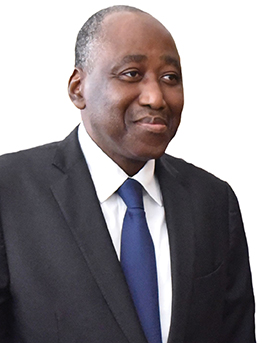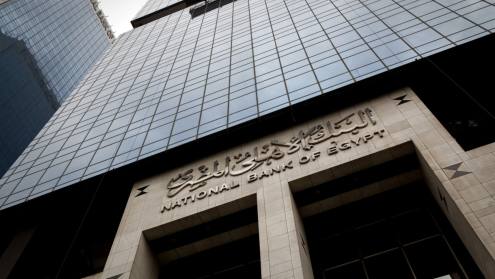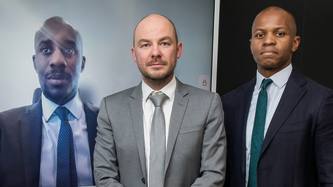Q: How would you characterise Côte d’Ivoire’s model of economic development?
A: For us, it’s really about consolidating the peace and stability that we have regained since the end of the civil war. The economy of Côte d’Ivoire has been based, for a long period, on agriculture: we are the world’s leading producer of cocoa, cashew nuts and various other agricultural commodities. There is a great diversification within our agriculture, and we are now engaging in a sustained effort to increase the domestic processing of these commodities because it generates jobs.
About 70% of the population is under 35 years old, so this process of transformation is important because it will generate more jobs for the youth. Beyond agriculture, there is also the mining sector, which we hope will become an important driver and second pillar of the economy. We have bauxite, manganese, iron, and gold, among other resources, and so we hope the mining sector will make an important contribution to the economic development of our country.
Our aim here is not just to export raw minerals; we want to encourage operators to process those minerals locally so we can benefit from the added value. The real issue is making sure that companies involved in extracting and processing these resources can generate positive margins. As a government we can take advantage of those margins to address the social needs of our population, be they in the education or health sector.
Q: How can you encourage increased private investment to help you achieve this objective?
A: This will be done through an appropriate taxation policy. We have asked McKinsey to review our investment codes in order to make them attractive to the private sector. Not only do we want them to be attractive to investors but we would also like as a government to be able to address any social issues that we face. In the new code, we are looking to support sectors that are more likely to help us address our development needs. There will also be a strong emphasis on local content so that any investment raises more employment on the ground, strengthens small and medium-sized enterprises and improves the well-being of the population as a whole.
Total public and private sector investment levels in 2011 were 9% of gross domestic product. This increased to 20.5% in 2016 and is forecast to reach 24% in 2020. By 2020, between 7% or 8% of total investment will come from the government, while the remainder is projected to originate from the private sector.
Q: How has the government responded to the fall in cocoa prices?
A: Global cocoa prices have fallen by about 35% since the end of 2016; the government has had to adopt a number of measures in response. One was that the minimum price paid to cocoa farmers (to avoid price volatility) was reduced from 1100CFAFr [$2] per kilo to 700CFAFr per kilo. This represents a loss of revenue for these producers. But the fall in global prices has been so significant that even at 700CFAFr per kilo, the government has had to give up some of its fiscal revenues to support this price for the producers. As a result, we have agreed a new fiscal deficit of 4.5% in 2017 with the International Monetary Fund [IMF].
Q: How realistic is the government’s fiscal deficit target of 3% by 2019, given that payment demands from factions in the military, as well as civil servants, have contributed to a higher than planned fiscal deficit this year?
A: Our projected fiscal deficit for 2017 is 4.5%, which takes into account the fall of cocoa prices and the solution that was found to answer the grievances of certain factions in the military. With regard to the civil servants, who also held demonstrations earlier this year, their situation was addressed by the signing of a five-year social truce. During these five years, the government will do its part to address their demands. In return, they have committed to no longer demonstrating like they did at the beginning of the year.
The effect of this this truce is reflected in a projected deficit of 3.7% in 2018 and 3% in 2019. We inherited many of these difficulties and we, as a government, have played our part in solving these problems. [Looking to the future] we cannot accept grievances that would jeopardise Côte d’Ivoire’s macroeconomic framework and we will deal with any events that might with this in mind.
Q: What progress has the government made on the structural reform of public enterprises, such as SIR, the national refinery?
A: It’s a very important question because state enterprises, if they are underperforming, can have a negative impact on public finances – particularly when the state has a large share in those entities. We take this question seriously. The Ministry of Budget has been renamed as the Ministry of Budget and State Portfolio, which means Côte d’Ivoire is going to be more involved in how it manages its portfolio of state enterprises.
We have established a new performance contract between the government and the various public enterprises in which we have a stake. The national refinery, for example, has incurred many losses over the past few years, which is why structural reform is necessary. The government’s mid-term review conducted in July shows SIR is no longer in the red so this is very positive. But with regards to the debts that it has accumulated, which are generating financial costs, a restructuring process is now under way. We have agreed with the IMF that this debt will be restructured by December 2017.
Q: To what extent does political risk remain an issue for Côte d’Ivoire’s development?
A: There are two things that I would like to highlight. Côte d’Ivoire has hosted a UN mission – the United Nations Operations in Côte d’Ivoire [Unoci] – since 2004. Following a recent evaluation by the UN, it was found that the security situation in the country was at a reasonable level, and that Côte d’Ivoire has regained its political and institutional stability. As a result, the UN decided the Unoci mission would end in June 2017. This is a testament to the political and institutional security of Côte d’Ivoire.
The second thing is in June 2017, Côte d’Ivoire was elected as a member of the UN Security Council. That is an acknowledgment that we, as a country, can be relied upon. Obviously there are difficulties that we have to face from time to time, including crime and terrorism, as is the case with any other country.
Q: What is the biggest threat to Côte d’Ivoire’s continued economic growth?
A: Côte d’Ivoire is not an isolated economy; we are an economy operating in a global context. We have trade relations with various partners and we export our products to different markets. These relationships have an impact on our economy. So many of the risks and threats that we face are linked to the health of the global economy. For example, the price of cocoa is determined on international markets – including in London, where the global benchmark is typically set.
This means the price of cocoa is listed in pounds. Since the CFA franc is pegged to the euro, any drop in the value of the pound that may occur as a result of the Brexit process would be a loss for us. So we are hoping the UK economy remains buoyant and stable. We cannot avoid the fact that we are a country that is subject to global threats. We are an open country and we intend to remain an open country.












